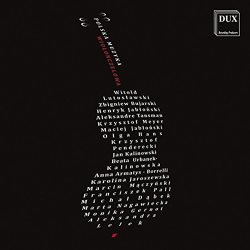| 
|
Polish cello music
Witold LUTOSŁAWSKI (1913-1994)
1. Sacher variation for solo cello (1975) [3:32]
Zbigniew BUJARSKI (b.1933)
2. Adagio for two cellos (2013)* [6:55]
Henryk JABŁOŃSKI (1915-1989)
3-5. Triptych for three cellos (1967) [13:10]
Aleksander TANSMAN (1897-1986)
6-7. Two movements for four cellos (1935) [8:59]
Krzysztof MEYER (b.1943)
8. Introspection No.2 for five cellos (1960)* [7:30]
Maciej JABŁOŃSKI (b.1974)
9. Cordissimo!!! for six cellos (2012)* [7:03]
Olga HANS (b.1961)
10. Sun Songs for seven cellos (1999)* [12:00]
Krzysztof PENDERECKI (b.1933)
11. From Polish Requiem (version for eight cellos 2007)* [7:21]
Jan Kalinowski (cello, 1-11), Beata Urbanek-Kalinowska (cello, 2-11), Anna Armatys-Borrelli (cello, 3-5, 8, 11), Karolina Jaroszewska (cello, 6-8, 11), Marcin Mączyński (cello, 6-7, 9-11), Franciszek Pall (cello, 8, 11), Micał Dąbek (cello, 9-11), Marta Nagawiecka (cello, 9-11), Monika Gernot (cello, 9-10), Aleksandra Lelek (cello, 10).
rec. Academy of Music, Cracow, Poland, 2012 and 2013.
*World Première recordings
DUX 0925 [66:32]
This disc is a refreshingly different and innovative way of presenting a programme of cello music. Each piece adds another instrument, going from a work for solo cello to a version of part of Penderecki’s Polish Requiem for eight cellos. It’s fascinating to hear how each additional cello adds different layers to the sound.
Commissioned by Rostropovich Lutoslawski’s Sacher variation was dedicated to the seventieth birthday of Paul Sacher the Swiss conductor who caused so much 20th century music to be written. Like all the works the rich sounds of the cello are exploited to the full with the lower registers given a particularly prominent role.
Zbigniew Bujarski is an emeritus professor at the Music Academy in Cracow where he also paints. His Adagio for two cellos written in 2013 is an extremely effective work that uses two cellos in such a way that the sound made by one seems to revolve around the other and at other times appearing to merge into a single unified whole.
Reading the booklet notes, Henryk Hubertus Jabłoński wrote around 500 works but still appears to be little known outside Poland. His Triptych for three cellos from 1967 reflects his love for his most favoured instrument with some gorgeous harmonies that make the most of the cello’s singing abilities.
Aleksander Tansman is a fascinating character whose piano music is presently becoming widely available. At one time in the 1920s when he lived in Paris he was programmed by almost all the concert societies and was also gaining recognition in the USA. The hallmark of his music is its wonderfully lyrical qualities. He knew how to write a good tune and didn’t feel compelled to go for the sounds of the avant-garde as so many others were. His Two movements for four cellos that date from 1935 were commissioned by the American Foundation and are the most melodically satisfying of all the works on the disc. The rich sonorities of the cellos are cleverly exploited to enable them to sound like different instruments at times — think low violas and high double basses.
Krzysztof Meyer is a author of books on music, a teacher and a pianist as well as a composer. With no fewer than five cello concertos under his belt, as well as other works written for it, he clearly favours this most expressive of instruments. His Introspection No.2 for five cellos written when he was only 17 shows not only originality but a highly developed ability for writing for the cello. This allows, as he is quoted as saying, “players to show their beautiful singing sound, as well as their technical skills”.
Cordissimo!!! for six cellos by Maciej Jabłoński — born in 1974 not 1962 as stated on the reverse of the disc and in the booklet — is a fascinating exploration of how six cellos can be made to speak with individual voices. They circle each other bringing to my mind a clump of shoots emerging from the ground as they rise ever upwards towards the light. At different times some race ahead to pass the others in a very effective and sonically affecting piece.
Olga Hans is the sole female composer, represented here by the longest work on the disc, the pleasingly entitled Sun Songs for seven cellos, written in 1999. It is a beautiful piece full of the most gorgeous harmonies with the power and sweep that seven cellos can render so effective.
The final work is by the greatest of all living Polish composers, Krzysztof Penderecki. It is a version for eight cellos that he adapted from the Agnus Dei - part of his Polish Requiem. The Requiem was given its première at a mass to celebrate the life of Mstislav Rostropovich who had died a few months earlier. The use of such a large number of cellos adds a new dimension to this profound work and was a fitting tribute to one of the last century's greatest cellists.
The reverse of the disc has an asterisk against several of the works implying world première recordings. While it seems certain that the Bujarski, Maciej Jabłoński and Olga Hans works are indeed first recordings and that it is almost so in the case of the piece by Krzysztof Meyer there is some uncertainty as to whether the Penderecki has been recorded previously. In any event this was a most satisfying disc to listen to and the cello is such a wonderfully rich and expressive instrument that one could never tire of hearing it. Coupled with that all the featured cellists are at the top of their game, turning in superb performances of extremely interesting works.
Steve Arloff
 |
 |
|
